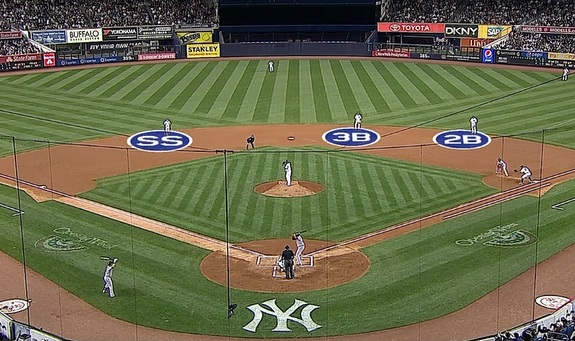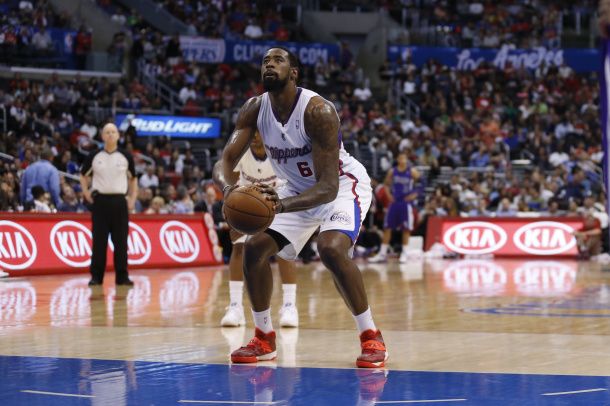Clunk! Bang! Whistle! Rattle! Boink! Whistle! Smack! Thwack! Whistle!
Those are just some of many sounds of the controversial strategy, and as San Antonio Spurs head coach Gregg Popovich continues to make use of the "Hack-a-Shaq," or in his case, the "Hack-a-DeAndre Jordan" tactic, rumors alike have stirred regarding a potential change to the rule. NBA commissioner Adam Silver has mentioned a possible rule change as recently as five days ago, but as the argument over the quirky tactic will intensify, why not look further into the Hack-a-Shaq issue?
Back in the 1960s, a sort of "Hack-a-Wilt" was used towards the end of close games involving Wilt Chamberlain. Wilt's opponents would essentially play a game of tag with him, chasing him around the floor whether or not he had the ball to commit a foul and send him to the free throw line. Wilt had a career 51% free throw clip, and the strategy would pay off for teams thanks to Wilt's pure reluctance to shoot them. However, the NBA eventually changed the rule so that off the ball fouls in the last two minutes would result in free throws and possession. Pat Riley might've put it best, saying that "The reason they have that rule is that fouling someone off-the-ball looks foolish . . . Some of the funniest things I ever saw were players that used to chase [Wilt Chamberlain] like it was hide-and-seek. Wilt would run away from people, and the league changed the rule based on how silly that looked."
The actual birth of the Hack-a-Shaq technique occured in the 1990s, as Don Nelson theorized that by constantly fouling the worst free throw shooter on the floor, it might yield fewer points per possession than if his team were playing regular defense. Nelson originially used the tactic on Dennis Rodman of the Chicago Bulls on December 30th, 1997, and understandably so, as the alternative would be playing defense against Michael Jordan and Scottie Pippen. In that game, Rodman went 9-for-12 from the free throw line, and Chicago won by six.
In a similar situation, Shaquille O'Neal, who responded to the strategy named for him with defiance, was shooting 38% from the charity stripe in December during the 2000-01 season. The Lakers hired Ed Palubinskas, a career 90% free throw shooter, to help O'Neal's free throws woes. Shaq would go on to shoot 68% over the last 15 games of the season, including a 13-for-13 performance in L.A's final home game of the season against the Denver Nuggets, prompting him to bark "It doesn't work any more!" at his oppponents.
The examples of Rodman and Shaq bring up an important issue of the Hack-a-Shaq argument. Free throw shooting is a core part of the game of basketball, and it has been since the game's inception. Basketball coaches try to win games by exploiting their own strengths and their opponent's weaknesses, like defense, three-point shooting, size, length, and a whole lot more. So, why shouldn't poor free throw shooting be exploitable too?
An interesting comparison comes to mind: the increasingly popular defensive shifts in baseball. Shifting infielders in a strategic manner began in the 1920s, but has become more favored in recent years, resulting in everyday situations like this:

Shifts like these are usually used to exploit left handed pull-hitters who rarely poke hits to the opposite field. So, when a big southpaw bat like David Ortiz comes to the plate, shouldn't defenses be allowed to shift accordingly to exploit Big Papi's inability to hit balls the other way? Pitchers don't throw fastballs down the middle on every hurl. They mix it up, throwing curves, changeups, and breaking pitches alike to keep hitters on their toes. So, why shouldn't infielders be able to mix it up too? The argument against the infield shift is a bit different than the argument against Hack-a-Shaq; critics of the shift argue that it's a major factor in the offensive decline in baseball, but the improvement in Major League pitching has been a factor as well.
Here's the point: if you're a proffessional baseball hitter, you can't just go to the plate and pull the ball everytime. If you're in the majors, you should be able to react to defensive changes by poking the ball the other way, or even go the Lucas Duda route and beat the shift by bunting the ball. Pull hitters shouldn't rely on a potential rule change, but learn to adapt, just like Shaq and Rodman did.
Unlike the Hack-a-Shaq technique, infield shifts don't slow down the general flow of the game, but they should stay in baseball for the same reason Hack-a-Shaq should stay in the NBA; players must learn to adapt to different defensive approaches, because that's how sports work. Additionally, both techniques can actually create some amusing situations like Lucas Duda drag bunts, literal infield walls, Gregg Popovich having a laugh with Shaq, and hugging fouls by the Red Mamba.
The victims of Hack-a-Shaq shouldn't cry out for rule changes, but like Lucas Duda and his sneaky bunts, they should learn how to beat the technique. The Los Angeles Clippers lead the NBA in points per possession, with 1.098. If the Clips only shot free throws down on each possession, they could equal their usual offensive output by shooting just a measly 55% from the charity stripe. In the regular season, the Clippers shot 71% from the line as a team, third to last in the league. Meanwhile, L.A's starting center DeAndre Jordan is a career 41.5% free throw shooter, and a 36.7% shooter in the ongoing series with the San Antonio Spurs. That's unbelivable, with the bad connotation to that phrase.
Jordan is a proffessional basketball player, a 6' 11'' behemoth with a 7' 6'' wingspan and arms like meaty tree branches. But, why can't he make free throws? It doesn't make sense!
Just like Lucas Duda and David Ortiz, DJ must adjust. By improving his free throw shooting, Jordan wouldn't just stop Popovich from employing Hack-a-DJ, but his game would become more complete.
And that's the point. Major sports leagues shouldn't be able to use rule changes to bail out players who are being exploited, because the exploitation of your opponents weaknesses is how defensive game plans work! Pop isn't an evil mastermind trying to ruin the pace of the NBA, he's an evil mastermind trying to win another championship. Changing the rule would take away an actual strategy, an actual approach, which would make the NBA more about athleticism and one-on-one showcases that made the league boring in the first place.
Indeed, Hack-a-Shaq creates more than it destroys. It can make games grittier, increase the pure defiance of players, and give a league that has struggled with significant disparity among teams a more unpredictable product. And, even though it slows games down, Hack-a-Shaq somehow makes games more fun. Come on, would you rather watch Thursday's Game 6 between the Spurs and Clippers with 30 combined minutes of Hack-a-DJ, or would you rather watch the Sixers and Knicks play a game without it?










































